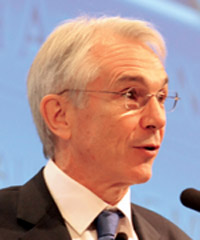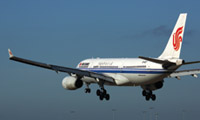69th IATA AGM
Airlines sign emissions plan as govts struggle
With hope all but gone of a global deal on aviation emissions being reached at September’s International Civil Aviation Organization (ICAO) Assembly in Montreal, the world’s airlines have signed an initiative that will lead to carbon neutral growth in the industry by 2020. Carriers hope it will prove acceptable to governments around the world.
July 1st 2013
With the threat of an aviation trade war lingering in the air and an ICAO special task force showing no signs of finding a solution to the issue of airline emissions, International Air Transport Association (IATA) director general and CEO, Tony Tyler, was pulling no punches when he delivered his state of the industry report at the association’s 69th annual general meeting in Cape Town last month. Read More »
 |
| 'Governments are struggling to find a solution. And many are asking for our guidance' |
| Tony Tyler Director General IATA |
If governments failed to find a solution, airlines would have to lead the way, he said.
“Without a united industry position we would cede the opportunity to influence governments on MBMs (market-based measures). And we leave ourselves defenceless to fight what governments might come up with,” said Tyler.
“Governments are struggling to find a solution. And many are asking for our guidance. With these considerations, it is painfully obvious that it is in our individual and collective interests to let those governments know the direction in which we would like them to move.”
Tyler got his way. The IATA meeting overwhelmingly endorsed a resolution on “Implementation of the Aviation Carbon-Neutral Growth (CNG2020) Strategy”, which provides governments with a set of principles for establishing procedures for a single, global MBM and integrate it as part of an overall package of measures to achieve CNG2020.
“Now the ball is in the court of governments,” said the IATA chief. “We will be strongly supporting their leadership as they seek a global agreement through ICAO at its assembly later this year.”
Finding a solution has become critical with the looming threat of the reintroduction of Europe’s controversial emissions trading scheme (ETS), which was suspended for one year for non-European carriers last November.
There had been global opposition to the ETS, with the Chinese and Indian governments forbidding their airlines to participate.
While Europe’s “stop the clock” action lowered the temperature it was raised again in May when the European Commission (EC), the administrative arm of the European Union (EU), said Air China and Air India were among 10 Chinese and Indian airlines facing the prospect of financial penalty and exclusion from airports in Europe for refusing to comply with its emission rules in 2012. They face fines totalling more than $3 million for failing to provide emissions data to the European authorities.
 |
| Air China: among 10 Chinese and Indian airlines facing the prospect of fines and exclusion from airports in Europe for refusing to comply with Europe’s emission rules in 2012 |
Connie Hedegaard, the EU commissioner for climate action, said there was no excuse for the airlines to ignore Europe’s system.
Airlines want a single global scheme overseen by ICAO, fearing that if there is no agreement they will end up facing a patchwork of emissions schemes and environmental taxes across the world.
The problem is that governments have been unable to agree on a solution that could be put before the ICAO Assembly in September. There is still disagreement about mechanisms for charging for emissions from flights that cross borders, dealing fairly with developing countries and if airlines, states or both should be subject to regulation. The assembly meets once every three years.
In Cape Town Tyler warned airlines that if they couldn’t find a compromise they would lose a golden opportunity to give governments the guidance for which many were asking.
“That means bridging the gap between those who say we should divide the bill based on your share of total emissions and those who say we should divide the bill based on your share of growth,” he told delegates.
If airlines didn’t agree, governments would decide on their behalf. “Some will impose environmental taxes. The UK, Germany and Austria already have. Others may focus on total emissions rather than just growth,” said Tyler.
“A few may do nothing, an option that also creates competitive distortions. Others might find even more expensive ways to penalize emissions, that possibly are completely disproportionate to our emissions contribution.”
The agreement reached in South Africa focuses on a single global MBM as part of a basket of measures.
It attempts to address some sensitive issues, such as whether the whole industry should pay for its emissions or whether the airlines growing the most should pay the most. The IATA plan includes safeguards to resolve these issues.
A single MBM will be critical as a gap-filler until technology, operations and infrastructure solutions mature. “We cannot take our eye off the ball on developing sustainable, low-carbon alternative fuels, achieving the Single European Sky or the host of other programmes that will improve aviation’s environmental performance,” said Tyler.
The principles put forward by airlines under their agreement, includes setting industry and individual carrier baselines using the average annual total emissions over the period 2018–2020. Also, agreeing to provisions and adjustments for recognizing early movers benchmarked for 2005–2020 with a sunset by 2025, accommodating new market entrants for their initial years of operation, including fast growing carriers and adopting an equitable balance for determining individual carrier responsibilities.
That would include an ‘emissions share’ element (reflecting the carrier’s share of total industry emissions) and a post-2020 ‘growth’ element (reflecting the carrier’s growth above baseline emissions). Reporting and verification of carbon emissions would be based on a global standard to be developed by ICAO.
“For governments, finding agreement on MBMs will not be easy,” said Tyler. “It was difficult enough for the airlines, given the potential financial implications.
“Bridging the very different circumstances of fast growing airlines in emerging markets and those in more mature markets required a flexible approach and mutual understanding. But sustainability is aviation’s license to grow.
“This industry agreement should help to relieve the political gridlock on this important issue and give governments momentum and a set of tools with which to work as they continue their difficult deliberations.”
Aviation is the first industry to suggest a global approach to the application of a single MBM to manage its climate change impact. It has agreed to targets of improving fuel efficiency by 1.5% annually to 2020, capping net emissions with CNG2020 and cutting emissions in half by 2050 compared with 2005.